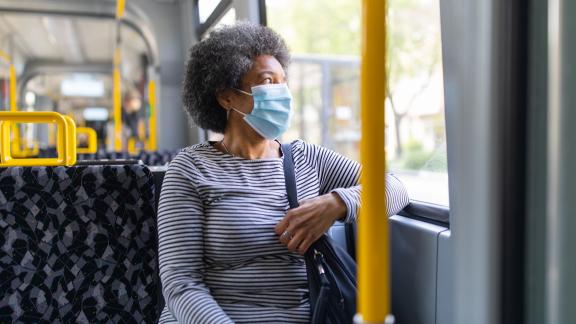What does ‘protect the NHS’ mean in ‘living with COVID-19’ Britain?

We can’t treat COVID-19 like any other respiratory illness, because it isn’t. So perhaps we should consider treating other respiratory illness like COVID-19. Layla McCay shares her view on what must be done to protect the NHS and live with COVID-19.
Back in the early days of the pandemic, the slogan ‘Protect the NHS’ made sense – it galvanised measures to reduce the spread of COVID-19 so that hospitals and clinics across the country were not faced with more patients than they were able to treat, which in turn meant they were able to continue delivering the care people needed.
Was that protection achieved? Partly, yes. In the short term, we were spared the horrifying scenes in countries like Italy where hospitals could not accommodate people who were very sick with COVID-19. But also, partly no, over the longer term.
Two years later, the impact of COVID-19 has meant that parts of the NHS continue to struggle to accommodate every person who needs healthcare, as soon as they need it, despite best efforts. More than 6 million people are now waiting for planned care and long waits for ambulances and frustrations with accessing primary care appointments mean that only just over a third of the public currently say they feel satisfied with the NHS.
Protecting the NHS for the future
So, what should protecting the NHS look like for the future? Taken broadly, it could mean empowering the health service with the resources it needs to provide the range of services and care the public has come to expect. However, if these resources are not made available, then the government must be prepared to level with the public about the services on offer and how quickly they can access them.
Rather than treating COVID-19 like other respiratory illnesses, perhaps we should consider treating other respiratory illnesses a little more like COVID-19
Alternatively, we could focus the Protect the NHS slogan, coined for the pandemic, on protecting the NHS in the context of COVID-19. The government wants the next phase of the country’s COVID-19 response ‘to enable the country to manage COVID-19 like other respiratory illnesses.’ But COVID-19 is not currently like any other respiratory illness, this pathogenic addition to the country’s repertoire of respiratory illnesses is a significant one.
Rather than treating COVID-19 like other respiratory illnesses, perhaps we should consider treating other respiratory illnesses a little more like COVID-19.
Respiratory illnesses have long been a challenge for the UK. Pre-COVID-19, the UK already had a higher mortality rate for infectious respiratory disease than most of Europe. A fact that rears its head each winter when the NHS finds itself having to operate at the very top of its capacity to deal with the seasonal rise in respiratory infections like influenza, pneumonia, and respiratory syncytial virus (RSV).
Adding COVID-19 to this potent mix will create two big challenges for the NHS. When surges coincide with winter, an NHS already operating at full stretch will have to factor in a whole extra disease that demands a lot of additional capacity. This will likely result in more disruption to other NHS services than seen in pre-COVID-19 winters. And if frequent COVID-19 surges occur in other seasons, the whole year could feel like winter for the health service, and this would be unsustainable.
Prevention is better than cure
So, what’s the answer? This needs to be a national conversation. Returning to the first definition of Protect the NHS would mean increased resourcing and expansion of NHS capacity to absorb the extra impact of COVID-19. To some extent this will be necessary. But as the adage goes, prevention is better than cure. To achieve a sustainable NHS in this new COVID-19 era, perhaps the moment has come to get serious about reducing respiratory illnesses in the UK.
...a true Living with Covid plan should incorporate prevention of respiratory illnesses at a system level
There is a wealth of research about preventing respiratory transmission over the pandemic and there is scope for much of it to be further implemented in the UK. The focus on personal responsibility to prevent COVID-19 spread has long been emphasised, but a true Living with Covid plan should incorporate prevention of respiratory illnesses at a system level. This means vaccination, but also investment in ventilation and other ways of improving the air quality of indoor spaces to reduce the risk of people catching a respiratory illness while going about their daily lives. It also means supporting individuals to not spread the virus, by adequately supporting sick leave, using testing and contact tracing strategically, and normalising the wearing of high-quality masks when needed.
1 April marks a transition for England to the next stage in our COVID-19 journey. Research and experience offer us several valid routes forward. The sustainability of the NHS depends on the government bringing these together wisely into a roadmap that does not simply lead to removing restrictions and hoping for the best, but to successfully Living with Covid.
Dr Layla McCay is director of policy at the NHS Confederation. You can follow Layla on Twitter @LaylaMcCay



